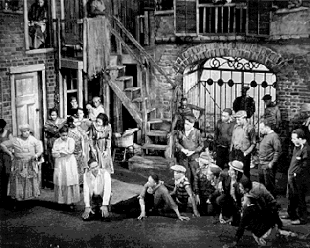Porgy And Bess
| Porgy and Bess | |
|---|---|
| Opera by George Gershwin | |

|
|
| Librettist | DuBose Heyward |
| Language | English |
| Based on | Heyward's novel Porgy |
| Premiere | September 30, 1935 Colonial Theatre (Boston) |
Porgy and Bess is an English-language opera composed in 1934 by George Gershwin, with a libretto written by DuBose Heyward and Ira Gershwin from Heyward's novel Porgy and later play of the same title. Porgy and Bess was first performed in Boston on September 30, 1935, and featured an entire cast of classically trained African-American singers—a daring artistic choice at the time. After suffering from an initially unpopular public reception due in part to its racially charged theme, the Houston Grand Opera production of the opera in 1976 gained it new popularity, eventually becoming one of the best-known and most frequently performed operas.
Gershwin read Porgy in 1926 and proposed that he should collaborate with Heyward on Porgy and Bess. In 1934, Gershwin and Heyward began work on the project by visiting the author's native Charleston. Gershwin explained why he called Porgy and Bess a folk opera in a 1935 New York Times article: "Porgy and Bess is a folk tale. Its people naturally would sing folk music. When I first began work in the music I decided against the use of original folk material because I wanted the music to be all of one piece. Therefore I wrote my own spirituals and folksongs. But they are still folk music – and therefore, being in operatic form, Porgy and Bess becomes a folk opera." The libretto of Porgy and Bess tells the story of Porgy, a disabled street-beggar living in the slums of Charleston, South Carolina. It deals with his attempts to rescue Bess from the clutches of Crown, her violent and possessive lover, and Sportin' Life, her drug dealer. Where the earlier novel and stage-play differ, the opera generally follows the stage-play.
In the years following Gershwin's death, Porgy and Bess was adapted for smaller scale performances and was later adapted into a film in 1959. Some of the songs in the opera, such as "Summertime", became popular and frequently recorded songs. In the late 20th and early 21st centuries, the trend has been towards reproducing a greater fidelity to Gershwin's original intentions although other smaller-scale productions continued to be mounted. A complete version of the score was released in 1976; since then, it has been recorded several times.
...
Wikipedia
